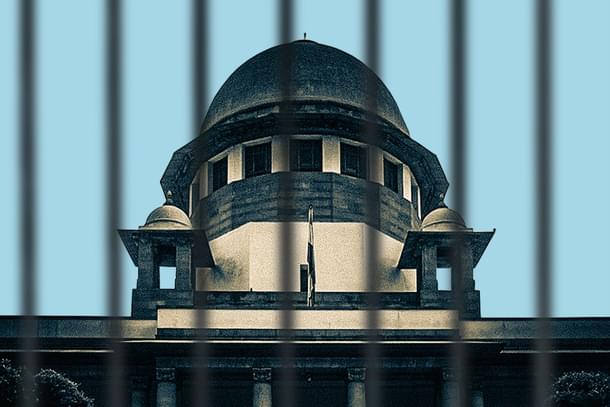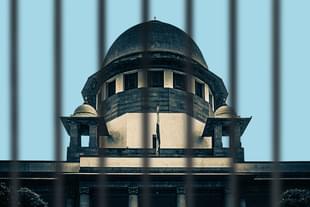Ideas
SC Covid Bench In Dangerous Terrain: Courts Aren’t Imperial Durbars That Can Adjudicate Everything
R Jagannathan
Jun 03, 2021, 12:09 PM | Updated 12:09 PM IST
Save & read from anywhere!
Bookmark stories for easy access on any device or the Swarajya app.


Do a random check of your daily newspaper for, say, one or two months. Find out if there is any week in which some higher court, either the Supreme Court or the high courts, is not directing some government or the other to do something or the other in the name of constitutional scrutiny.
In the last two months, thanks partially to the Covid crisis, there has been practically no day on which courts somewhere have not intervened to solve the country’s health problems since elected governments are apparently not competent enough to do their jobs.
If it is not about oxygen supplies, it is about vaccine policy; if it is not about universal vaccination, it is about pricing and procurement of medicines for handling Covid or mucor (black fungus).
When not castigating states for goofing up, the courts are full of helpful suggestions (or admonitions) on which healthcare model states must follow for handling Covid, how retired doctors must be roped in for temporary duty in prisons, why they won’t allow “experiments” with faulty ventilators, how delays in vaccine manufacturing must invite the charge of “manslaughter”, how companies must be made to use corporate social responsibility (CSR) funds for Covid, et al.
All that is one day’s work for our courts (as reported through various news items printed by The Times of India in its Mumbai edition dated 3 June 2021).
For the umpteenth time it has to be said: the biggest threat to our Constitution’s balance of power are the courts themselves, for they exercise no restraint in encroaching on executive or legislative domain whenever the mood catches them.
The latest Supreme Court order has called the Centre’s vaccine policy for the 18-44 group “arbitrary” and “irrational” (with which one can at least partially agree with), but it also offers gratuitous advice on monopoly purchases of vaccines by the Centre, questions the dual pricing policy, and points out the limitations of the Co-Win app for scheduling vaccinations in rural areas.
It demanded to know how the Rs 35,000 crore allocated for vaccinations in the Union budget have been used so far, when the 2021-22 financial year is barely two months old and vaccine supplies are still to be fully ramped up.
A three-judge bench under Justice D Y Chandrachud, even while paying lip-service to the executive’s lead role in dealing with the pandemic as it deems fit, pompously claimed that it cannot remain silent if the rights of citizens are violated.
The court’s statements of high purpose are truly breathtaking, and indicate a degree of megalomania, where governments are accountable to the courts and not the people.
Thus, even while acknowledging (in words, but not deeds) the constitutional principle of separation of powers, the bench hypocritically decided to do the opposite.
The bench admitted that it “does not have the authority or the competence to assume the role of the executive”, but still inserted itself into the job using the right to scrutinise anything for constitutional validity.
The bench said: “This separation of powers does not result in courts lacking jurisdiction in conducting a judicial review of these policies… judicial review and soliciting constitutional justification for policies formulated by the executive is an essential function, which the courts are entrusted to perform.”
Seeking “constitutional justification”, and not just logic and ideological reasonableness, for any policy is hazardous.
Let’s assume tomorrow we elect a liberatarian government which believes in less government and more private initiative. Will the courts then deem its policies as wrong, since anything can be said to impact the lives and liberties of citizens?
If a government decides that it will deregulate many areas, can the courts then ask it to re-regulate, since the purpose of any regulation is supposedly to guard consumer or citizen interests, and hence having a direct impact on life and liberty?
In theory, courts can look into policies that may infringe constitutional safeguards; in practice, political and economic ideologies are intrinsic to public choice in democracies. The courts cannot pronounce on policies driven by the ideological preferences of elected political parties.
The Supreme Court order of 2 June says it will look into policies involving vaccination, including, says The Times of India, the production and supply of vaccines, differential pricing, oxygen supply and auditing, supply of essential medicine and health infrastructure as well as insisting on change in policy towards free vaccination.
In short, the court will decide policy based on its own judgement. And how will it do this? Apparently by holding a 'durbar' in its own premises.
The bench said: “This court is presently assuming a dialogic jurisdiction where various stakeholders are provided a forum to raise constitutional grievances with respect to management of the pandemic… Hence this court would, under the auspices of an open court judicial process, conduct deliberations with the executive where justifications for existing policies would be elicited and evaluated to assess whether they survive constitutional scrutiny.”
The court has put itself in the role of an 'emperor' holding a court, a diwan-e-aam.
This is Unconstitutional, and Judicial Over-reach, in capital letters. In this judicial durbar, the executive will stand in the corner like an errant schoolboy and possibly be asked to do sit-ups and held accountable for its sins while all kinds of agenda-driven lawyers try to punch holes in policies. The bench will play judge, jury and executioner.
There is now very little separating a constitutional court from becoming a free-for-all kangaroo court.
Justice Chandrachud, who will be Chief Justice of India next year, is taking the judiciary in the wrong direction. If accountable governments are going to have to permanently watch their backs for fear of judicial intervention where there is little accountability, Justice Chandrachud, if he continues in this vein, will leave a large gash across the Constitution when he leaves the bench in 2024.
In that year, Narendra Modi’s government will be judged by the people of India; unfortunately, there will be no scrutiny of the Supreme Court.
How much more damage will the higher judiciary do in trampling over something as basic as the separation of powers? If the Supreme Court cannot restrain itself, why will the high courts ever do so? Justice Chandrachud is leading us to dangerous waters.
Jagannathan is former Editorial Director, Swarajya. He tweets at @TheJaggi.





